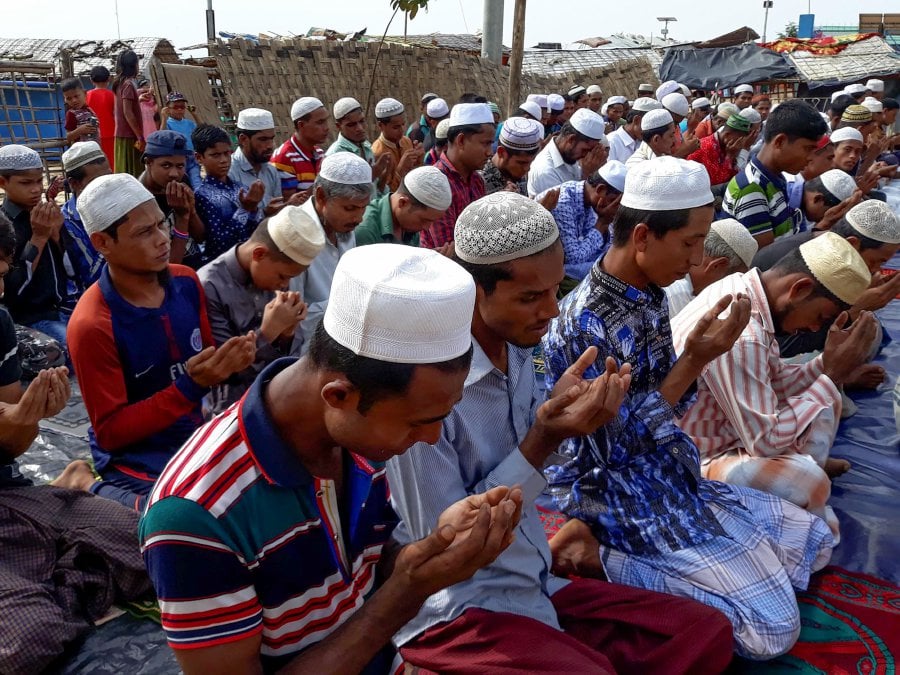Amid pain and hope, Rohingya celebrate Eid al-Adha in the 32 camps in Cox's Bazar
Refugees are celebrating the Feast of Sacrifice in open-air prisons. Shedding tears and praying, they call for an end to torture and a dignified return to their homeland. Some 2,200 animals were provided for the sacrifice, said Refugee Relief Commissioner Shamsud Douza. For Saiful Hossain, a resident of Camp 13, “this is not our country, and there is no joy”.
Cox's Bazar (AsiaNews) – Eid-al-Adha, which commemorates Abraham's willingness to sacrifice a son, is also being celebrated in the 32 refugee camps in Ukhi and Teknaf, Cox's Bazar, where more than 1.1 million Rohingya refugees are hosted.
The festive atmosphere comes with faint hope of returning safely to Myanmar after seven years in Bangladesh, in camps that are for all intents and purposes open-air prisons.
Memories of the brutal crackdown inflicted on the group by Myanmar’s armed forces, in response to the attacks by Arakan forces on 30 military outposts in Rakhine in August 2017, have far from faded.
During yesterday morning’s gathering, people burst into tears during prayers while some called for an end to inhumane torture and a dignified return to the homeland.
This morning, the Rohingya shouted and cheered in the streets, dressed in new clothes.
“This will be the seventh Eid al-Adha we are observing in Bangladesh,” said a sad Mohammad Zobair, acting president of the Arakan Rohingya Society for Peace and Humanity, speaking to AsiaNews. “When we were in Myanmar, we used to sacrifice two-three large cows. But since coming here, we have not had that opportunity.”
Many hope to celebrate the holy day in Myanmar next year; meanwhile, this year, celebrations and prayers were held in the 1,380 mosques and 970 Noorani educational institutions (madrassas) found in the 32 Rohingya camps in Cox's Bazar, Rohingya leaders explained.
Additional Refugee Relief and Repatriation Commissioner Shamsud Douza, reported that 1,800 cows and 400 goats were provided as sacrificial animals, fewer than in previous years.
“We have received a total of 2,200 animals for the Rohingyas, which falls short of the demand,” he explained. “Nonetheless, we are distributing the animals where they are most needed. After slaughter, the meat is being distributed under the supervision of camp leaders, assisted by local leaders."
There were some exceptions. “Compared to previous years, the Eid spirit is more evident in the camp this year,” said Mohammad Alam, chairman of the Leda Camp Development Committee in Teknaf. An additional “80 sacrificial animals were slaughtered this time, which is more than in previous years.”
Prayers were also recited for Palestinians and people affected by the ongoing conflict in Myanmar.
“Truthfully,” said Saiful Hossian, who lives in Camp 13, “Rohingyas never experience the joy of Eid because many, including our fathers and grandfathers, lie buried in our homeland. Today marks seven years, and I cannot visit their graves. What could be more difficult than this?” he said.
“While the children and teenagers may seem happy in the camp, the adults are not,” he added. “There is no money, no opportunity to improve as refugees. We cannot celebrate Eid here as we did in our country. After all, this is not our country, and there is no joy in that."
Archbishop Lawrence S. Howlader of Chattogram, chairman of the Bishops' Commission for Christian Unity and Interreligious Dialogue, brought greetings to Muslims for Eid-al-Adha, the second most important holy day in Islam.
“Muslim brothers and sisters sacrifice animals as a symbol of love for Allah,” he said in his statement. “Alongside sacrificing animals, let us also sacrifice all negative aspects such as envy, hate, and selfishness. I wish you all a peaceful and blessed Eid,” he added.
06/12/2023 14:07
08/09/2018 06:23
24/05/2023 14:50







.png)










